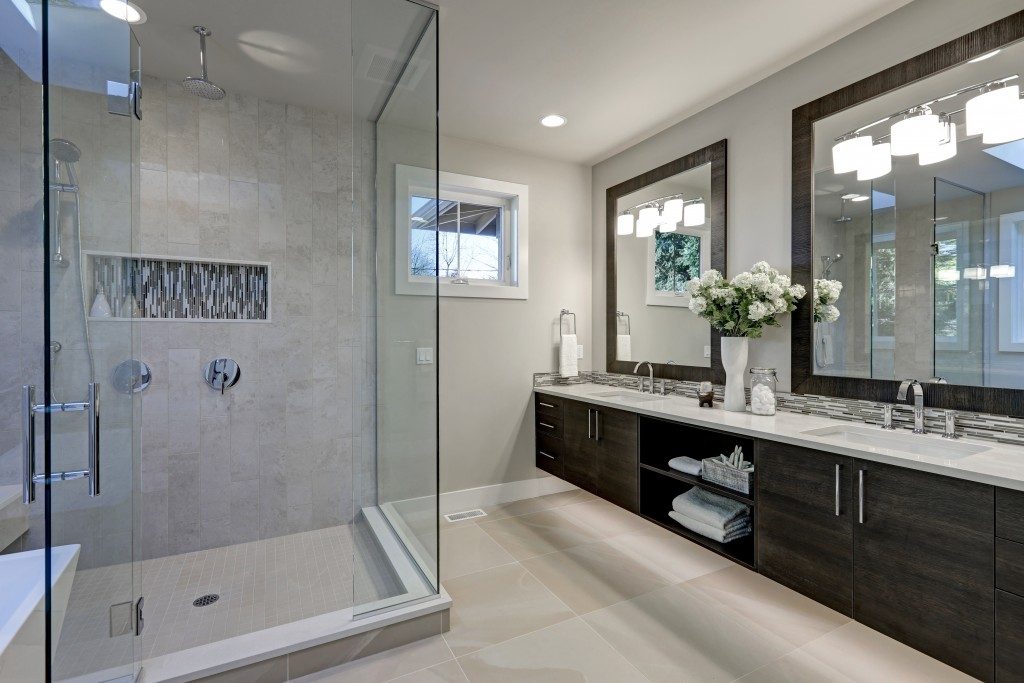This year, sleek and modern kitchens and bathrooms are in. Since the advent of smart technology, this is also the age of smart kitchens and bathrooms. This means blending form, function, and aesthetics in the designs. It’s all about creating refreshing spaces that elevate the functionality of a room, making day-to-day activities a breeze.
Here are the high-tech but low-maintenance kitchen and bathroom design trends in 2019, according to industry experts.
Minimalism is still in
The purpose of minimalism is not only to reduce clutter, it’s also meant to maximize room for movement and storage space. For bathrooms, freestanding tubs are all the rage right now, according to the National Kitchen and Bath Association. Oval freestanding tubs are sleek, elegant, and provide a nice geometric contrast to the sharp corners and angles of the walls and windows.
For the kitchen, hidden cabinets and drawers are in today because it creates the illusion of a cleaner and wider space. In terms of hardware, stainless steel and gold are a thing of the past while matte black sinks, faucets, and other details are quickly gaining traction. Compared to fingerprint-prone stainless steel, matte is an appealing alternative since it’s low-maintenance.
Glass backsplashes and quartz kitchen countertops are also trendy. They’re sleek, have clean lines and silhouettes, and are easy to care for, which fits the whole minimalism theme. These aren’t just tiles; they’re entire slabs of glass or quartz cut to precisely fit sections of your kitchen. These eliminate the ugly cracks between tiles that can potentially house bacteria and mold if not properly cleaned.
Smart technology
 Smart toilets have more evolved functions today apart from automatic flushes. And they’re not exclusive to the loos in Japan; you can easily have them in your home. Newer toilet models have built-in bidets, dryers, light installations, self-cleaning features, and even seat warmers.
Smart toilets have more evolved functions today apart from automatic flushes. And they’re not exclusive to the loos in Japan; you can easily have them in your home. Newer toilet models have built-in bidets, dryers, light installations, self-cleaning features, and even seat warmers.
Apart from increasing the toilet’s functionality and the user’s comfort, these new features can also make the toilet more sustainable. The built-in bidet will cleanse the user after doing his or her business and the dryer will follow up with a strong but gentle gust of warm air. This reduces water usage and the need for toilet paper. Users can easily operate this through a range of controls and manipulate the water and air pressure and temperatures.
Although it’s not yet available in the market, there are also health-tracking smart toilets that can analyze bowel movements and other pertinent details. This innovation can bring numerous advantages for public health if it hits the mainstream market.
Voice-controlled appliances and fixtures are making their way to the kitchen and bathroom. This means you can simply tell your shower to start at your preferred temperature and spray setting, and pre-heat your oven or shout at your pot to fill with water as you’re dressing up in the other room.
Parents can now also have a personal assistant in the kitchen to help them navigate complex recipes and monitor the diet and nutrition needs of their family. Since this technology is voice-controlled, they don’t have to learn the confusing technical aspects of their smart kitchen.
When following kitchen and bathroom trends, keep in mind that they come and go. It’s always better to plan for the long term than the short run. Shift your focus from the “hot and trending” to designs that are beneficial, durable, and more economic.






